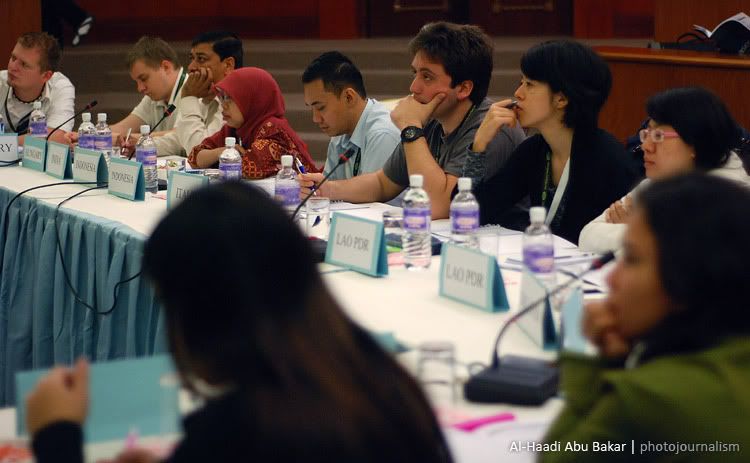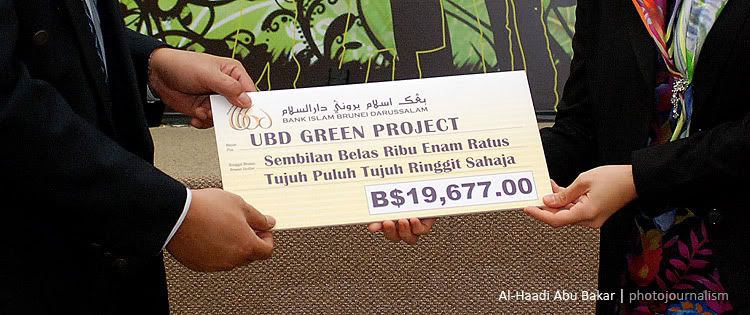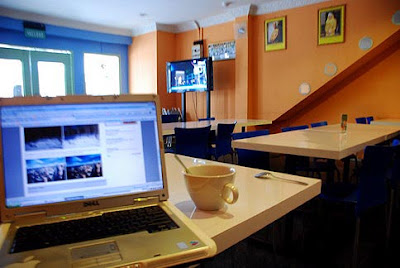Maktab Duli Goes Green

FROM recyclables to reusables.
This was the mission of 30 students from Maktab Duli Pengiran Muda Al-Muhtadee Billah (Maktab Duli) in Gadong as they collected recyclable materials and waste in their school compound over the past week to be recycled by a local company, Daijo recycling.
The 30 students are part of the 70 active members of the colleges' Environmentally Friendly Club (EFC).
The club supervisor, Dk Jaliha Pg Sahbudin, said the proceeds of the sale of the recycled waste would then be used to produce reusable bags bearing the college's logo as well as friendly message on encouraging shoppers to use reusable bags as their next project.
Use of reusable bags is being encouraged in the Sultanate after it marked its first No Plastic Day on May 3.
"These bags will be sold to the students and teachers in the college and they can use them to replace the plastic bags when they go shopping in supermarkets, thus helping the environment by reducing the number of plastic waste," said the club supervisor.
Dk Jaliha said the activities conducted yesterday were to encourage the young club members to inculcate a habit of conserving energy that they can practise in their daily lives, thus saving the environment from further destruction, and in the end, lead by example for the rest of the community in the country.
"Aside from doing our part in conserving the environment, we want to convey our beliefs and concerns to the public by starting with the students in the college, and then on to the students' parents and siblings who will later on pass the awareness to their friends, colleagues at work and neighbours, as a way to get our message across," she said.
"Through recycling, we are significantly cutting down the consumption of energy that would've been used to produce new materials, and at the same time slow down the process of depletion of resources," she added.
Aside from collecting recyclables, the students also did their part in conserving energy and protecting the environment by recycling wastes and planting crops organically in their campus.
Crops were planted near the school's old female hostel. The crops which consisted of various types of vegetables such as watercress and long beans were planted organically as Dk Jaliha said the benefits of organically-grown vegetables were far greater than the conventionally-grown due to the absence of various poisons such as pesticides.
"It's good to grow your own crops because you are assured that you've grown them organically and can always guarantee that your food is safer and healthier. Additionally, you can also control the amount of vegetables you use for your cooking, thus preventing food waste," said Dk Jaliha.
"Furthermore, you save energy (fuel) from travelling to buy vegetables from the market, and growing vegetables using organic fertilisers will not deteriorate the soil. Finally, gardening is good for your health, especially if you want to keep in shape," she added.
Dk Jaliha went on to say that planting fruits and vegetables organically at home may be slightly less cheaper than buying them from the supermarkets, but the environmental and health costs from the conventionally-grown crops far exceeds the organically-grown ones in the long term.
Asra Nursyakillah Rabaha, president of the club said that the project was a tremendous success for the club this year and is planning to make it an ongoing activity in the college.
"The response have been very positive. We've had non-member students contributing recyclable wastes to us as a sign of support for our drive towards helping the environment.We also have parents of students who came over today to deliver their recyclable wastes," she told The Brunei Times.
The 19-year-old said that that the experience gained from conducting the various projects and activities have been highly beneficial and educational for the group, while having tremendous fun engaging them.
Since its formation in 2008, the club has been involved in running several projects on environment conservation, including recycling campaigns, energy conservation and alternative packaging.
Last year, the club made headlines by contributing $890 to Bank Islam Brunei Darussalam (BIBD) in support of the tree planting project to restore the trees in Badas Forest Reserve which were lost to forest fires.


























